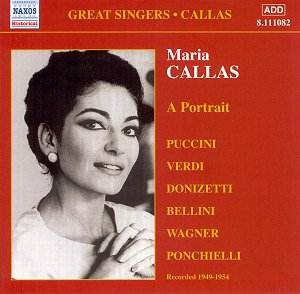|

BUY NOW
AmazonUK
AmazonUS
|
Maria Callas: A Portrait
Vincenzo BELLINI (1801
– 1835)
Norma: Casta Diva
I Puritani: O rendetemi la speme (w Nicola
Rossi-Lemeni, bass; Rolando Panerai, baritone);
Qui la voce sua soave (w Nicola Rossi-Lemeni,
bass; Rolando Panerai, baritone); Son vergin
vezzosa (w Aurora Cattelani, soprano; Giuseppe
Di Stefano, tenor; Nicola Rossi-Lemeni, bass
and Carlo Forti, bass)
Gaetano DONIZETTI (1797
– 1848)
Lucia di Lammermoor: Il dolce suono;
Ohimè! Sorge il tremendo; Ardon gli incensi;
splendon le sacre faci (w Gino Sarri, tenor;
Raffaele Arié, bass); Spargi d’amaro
pianto (w Raffaele Arié, bass; Tito Gobbi,
baritone)
Amilcare PONCHIELLI
(1834 – 1886)
La gioconda: O madre mia; Suicidio!
Giuseppe VERDI (1813
– 1901)
La traviata: Libiamo ne’ lieti calici
(w Francesco Albanese, tenor); E’ strano! E’
strano!; Ah, fors’ è lui
Giacomo PUCCINI (1858
– 1924)
Tosca: Mario! Mario! ... Son qui! (w
Giuseppe Di Stefano, tenor); Ora stammi a sentir
(w Giuseppe Di Stefano, tenor); Vissi d’arte
Richard WAGNER (1813
– 1883)
Tristan und Isolde: Liebestod (Sung in
Italian)
 Maria Callas (soprano), Orchestra and Chorus
of Teatro alla Scala, Milan/Tullio Serafin (tracks
1 – 4, 14 – 16); Chorus and Orchestra of the
Maggio Musicale Fiorentino/Tullio Serafin (tracks
5 – 8); Turin Italian Radio Symphony Orchestra/Antonino
Votto (tracks 9, 10), Gabriele Santini (tracks
11 – 13), Arturo Basile (track 17)
Maria Callas (soprano), Orchestra and Chorus
of Teatro alla Scala, Milan/Tullio Serafin (tracks
1 – 4, 14 – 16); Chorus and Orchestra of the
Maggio Musicale Fiorentino/Tullio Serafin (tracks
5 – 8); Turin Italian Radio Symphony Orchestra/Antonino
Votto (tracks 9, 10), Gabriele Santini (tracks
11 – 13), Arturo Basile (track 17)
Recorded in the Cinema Metropol, Milan, 1954
(track 1), in the Basilica di Santa Eufemia,
Milan, 1953 (tracks 2 – 4), in the Teatro Comunale,
Florence, 1953 (tracks 5 – 8), in the Auditorium
RAI, Turin, 1952 (tracks 9, 10) and 1953 (tracks
11 – 13), at the Teatro alla Scala, Milan, 1953
(tracks 14 – 16) and by CETRA (recording venue
unknown) on 8th November 1949 (track
17)
 NAXOS 8.111082 [68:11]
NAXOS 8.111082 [68:11]
|
Error processing SSI file
|

